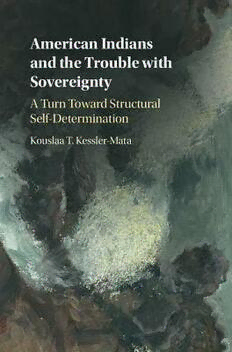
American Indians and the Trouble with Sovereignty: A Turn Toward Structural Self-Determination PDF
Preview American Indians and the Trouble with Sovereignty: A Turn Toward Structural Self-Determination
American Indians and the Trouble with Sovereignty With tribes and individual Indians increasingly participating in American electoral politics, this study examines the ways in which tribes work together with state and local governments to overcome sig- nificant governance challenges. Much scholarship on tribal governance continues to rely on a concept of tribal sovereignty that does not allow for or help structure this type of governance activity. The resulting ten- sion that emerges in both theory and practice from American Indian intergovernmental affairs is illuminated here and the limits of existing theory are confronted. Kessler-Mata presents an argument for tribal sovereignty to be normatively understood and pragmatically pursued through efforts aimed at interdependence, not autonomy. By turning toward theories of federalism and freedom in the republican tradition, the author provides an alternative framework for thinking about the goals and aspirations of tribal self-determination. Kouslaa T. Kessler-Mata is Associate Professor at the University of San Francisco. Prior to this position, Kouslaa served as a legislative fellow with the National Congress of American Indians in Washington DC and sat on the Board of Trustees for California Indian Legal Services. She is yak tityu tityu Chumash and Yokut, two tribes from Central California, and Irish American. American Indians and the Trouble with Sovereignty Structuring Self-Determination through Federalism KOUSLAA T. KESSLER-MATA University of San Francisco University Printing House, Cambridge CB2 8BS, United Kingdom One Liberty Plaza, 20th Floor, New York, NY 10006, USA 477 Williamstown Road, Port Melbourne, VIC 3207, Australia 4843/24, 2nd Floor, Ansari Road, Daryaganj, Delhi – 110002, India 79 Anson Road, #06-04/06, Singapore 079906 Cambridge University Press is part of the University of Cambridge. It furthers the University’s mission by disseminating knowledge in the pursuit of education, learning, and research at the highest international levels of excellence. www.cambridge.org Information on this title: www.cambridge.org/9781108415866 DOI: 10.1017/9781108235334 © Kouslaa T. Kessler-Mata 2017 This publication is in copyright. Subject to statutory exception and to the provisions of relevant collective licensing agreements, no reproduction of any part may take place without the written permission of Cambridge University Press. First published 2017 Printed in the United States of America by Sheridan Books, Inc. A catalogue record for this publication is available from the British Library. Library of Congress Cataloging-in-Publication Data Names: Kessler-Mata, Kouslaa T., author. Title: American Indians and the trouble with sovereignty : structuring self-determination through federalism / Kouslaa T. Kessler-Mata. Description: Cambridge ; New York : Cambridge University Press, 2017. | Includes bibliographical references and index. Identifiers: LCCN 2017035746 | ISBN 9781108415866 (hardback : alk. paper) Subjects: LCSH: Indians of North America—Legal status, laws, etc. | Indians of North America—Government relations. | Indians of North America—Politics and government. | Self-determination, National—United States. | Tribal government—Law and legislation— United States. | Sovereignty. Classification: LCC KF8205 .K47 2017 | DDC 342.7308/72—dc23 LC record available at https://lccn.loc.gov/2017035746 ISBN 978-1-108-41586-6 Hardback Cambridge University Press has no responsibility for the persistence or accuracy of URLs for external or third-party internet websites referred to in this publication and does not guarantee that any content on such websites is, or will remain, accurate or appropriate. For Chaan-hee, Pismono, and Doowan, In memory of Tamra Contents Preface page ix Acknowledgments xiii 1 The Conceptual Limits of Tribal Sovereignty 1 2 Building the Constitutive Theory of Tribal Sovereignty 28 3 Regional Dilemmas: The Politics of Tribal–State Relations 48 4 Disabling Arbitrary Interference 66 5 Political Participation: A Hallmark of Incorporation 81 6 The Constitutive Theory as a Theory of Freedom 105 Bibliography 125 Index 133 vii
